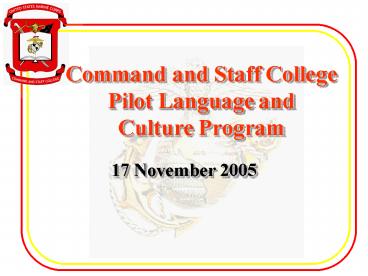Command and Staff College Pilot Language and Culture Program - PowerPoint PPT Presentation
1 / 13
Title:
Command and Staff College Pilot Language and Culture Program
Description:
Middle East culture component. Embedded in language study. Devoted class time ... Middle East cultural intelligence course (Joint Special Operations University) ... – PowerPoint PPT presentation
Number of Views:124
Avg rating:3.0/5.0
Title: Command and Staff College Pilot Language and Culture Program
1
Command and Staff College Pilot Language and
Culture Program
- 17 November 2005
2
Background
- Director CSCs operational experience in Iraq.
- USMC guidance.
- MARADMIN Number 01805, 18 April 2005 Marines
are required in billets around the world in which
proficiency in a foreign language is critical to
mission performance. - CMC visit to CSC Intent for all Marine officers
to study one of the difficult foreign
languages. - June 2005 Executive off-site language/culture
related initiatives (identify critical regions
and determine distance learning possibilities).
3
DoD Language Transformation Roadmap Current State
Current Situation Language and regional expertise
have not been regarded as warfighting skills, and
are therefore not incorporated into operational
or contingency planning. As a result, there is no
effort under the current requirements
determination process to prepare for support of
deployed forces. Language talent that may be
resident in the force (active and reserve
components, and civilian) is unknown and
untapped. Language and cultural expertise are not
valued as Defense core competencies.
4
DoD Language Transformation Roadmap Current State
Goal 1 Create foundational language and
cultural expertise Desired Outcome The Department
needs the right number of language professionals
with the right level of expertise in the right
languages. The Department also needs a corps of
language-enabled personnel capable of responding
as needed in support of peacetime and wartime
operations. We must develop an officer corps that
understands and values the strategic asset
inherent in regional expertise and language.
Finally, language and foreign area education need
to be incorporated into the officer Professional
Military Education.
5
Program Intent
- Develop officers who can operate in a foreign
environment to - Negotiate, using interpreters
- Be aware of social, cultural, political factors
of area of operations - Enhance ability to train and liaise with foreign
counterparts.
6
Course Structure
- Consultation with Defense Language Institute,
Foreign Service Institute, Service Academies,
Operating Forces. - Closest to Service Academy Programs
(non-intensive/part of broader curriculum). - Modern Standard Arabic (speaking, listening,
reading, writing). - Progressive introduction to colloquial Arabic
(Iraqi), DARPA interactive tactical video
program. - Not duplicate FAO Program.
7
Course Structure (cont)
- Address operational language requirements
(negotiations, training, liaison activities)
through scenario development. - Participate in final exercise focused on
irregular war scenario using language skills. - Middle East culture component
- Embedded in language study
- Devoted class time
- Supporting activities
8
Mechanics
- Mandatory for US students (168 students).
- Voluntary for faculty and international officers.
- Two 90-minute classes/ 34 weeks.
- 3 hours of language lab or PSPT/week.
- Tailored support on individual level.
- 11 students per class.
- 2 mobile language labs provided by HQMC (1 Dec
expected).
9
Mechanics (cont)
- Overseas staff rides Egypt and Tunisia
- 40 students
- Cultural and language immersion
- Battlefield staff rides
- Language-oriented MOUT exercise at 29
Palms, CA - Middle East cultural intelligence course (Joint
Special Operations University)
10
Program Management
- Use FORSCOM umbrella contract
- Central Texas College contractor
- Program run from Ft. Lewis, WA
- Management by periodic visits and weekly
teleconferences. - 8 Contracted instructors.
- Examining additional languages/area studies in
future years, based on USMC and DoD operational
needs - Chinese (Asia/Pacific)
- French (Africa)
11
Costs
- 550,000 Contractor -provided instructors.
- 45,000 Educational materials.
- 200,000 Practical applications and orientations.
12
Measures of Effectiveness
- Baseline set by Language Aptitude Test (Nov)
- Assessment based on Federal Interagency Language
Roundtable scale. - Test all skills (speaking, listening, reading,
writing). - Immersion program for superior performers.
- Demonstrate operational negotiation and
coordination skills.
13
Early Returns
- Language
- Good program.
- Normal growing pains.
- Not starting until September complicated student
time management































